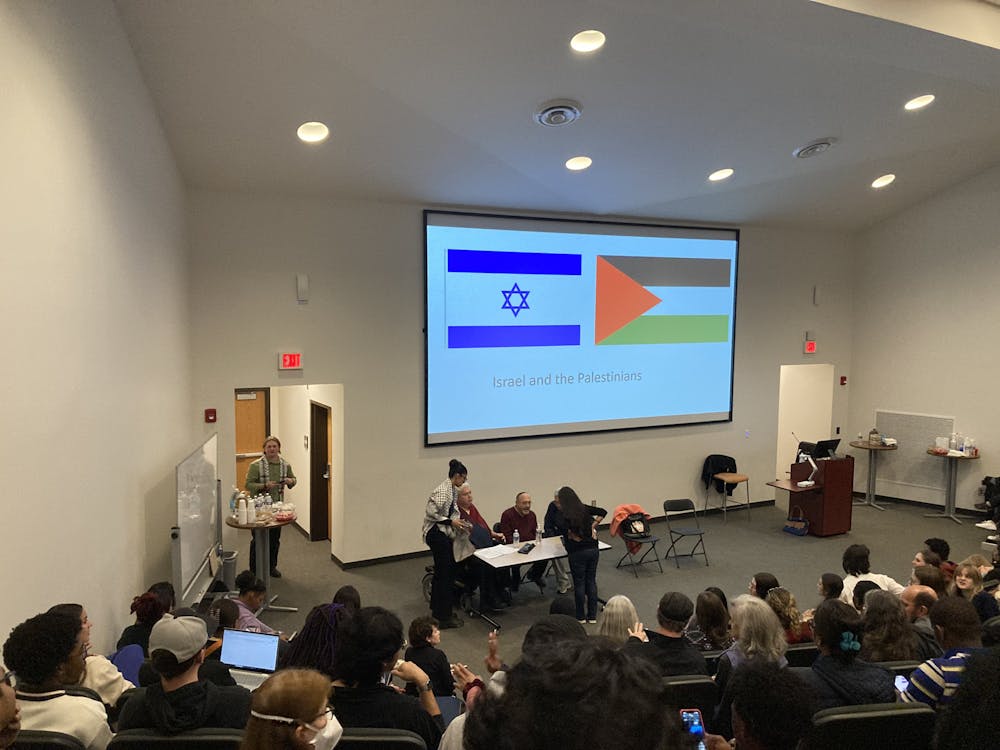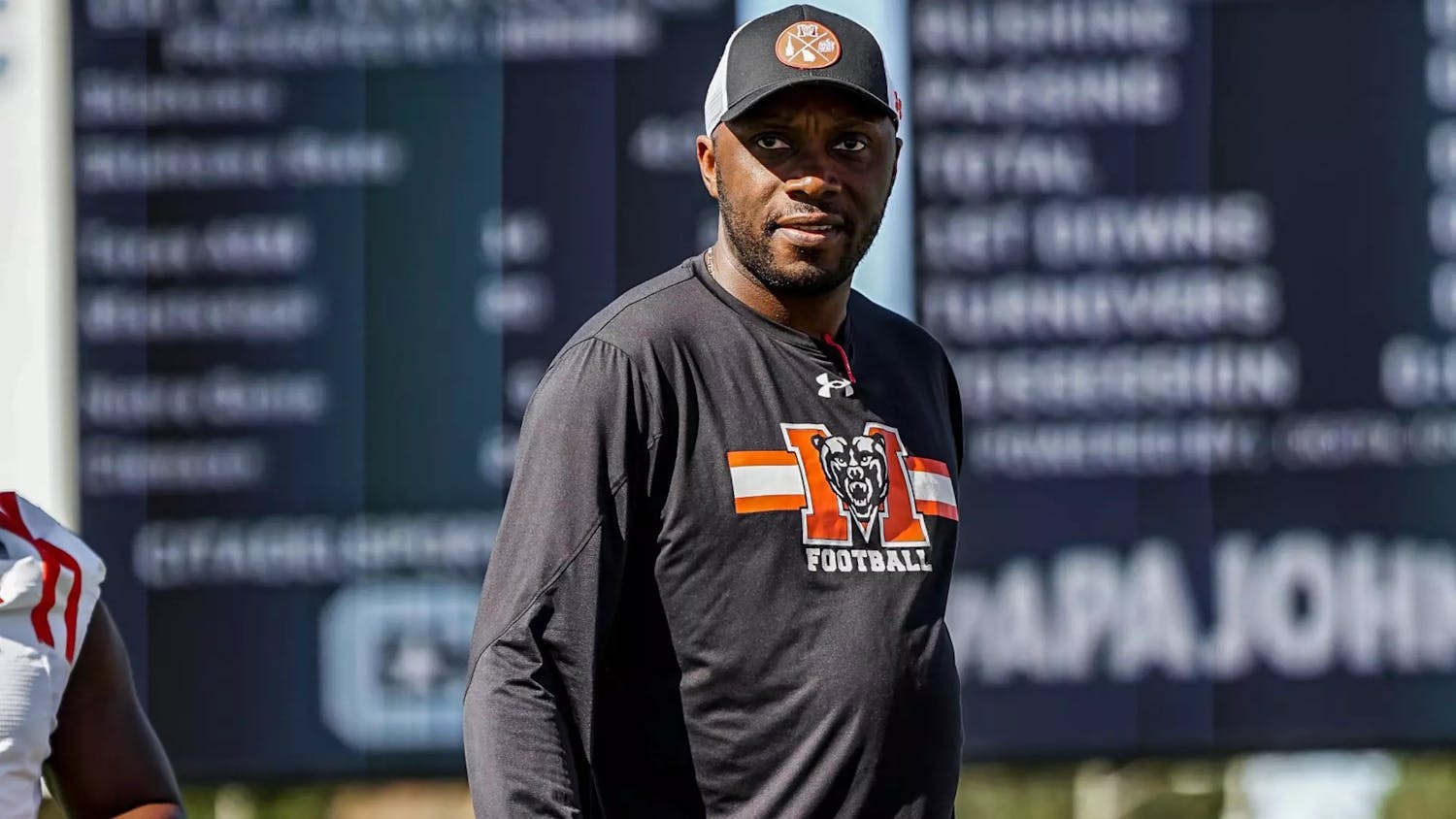Tonight's panel on the Israel-Palestine conflict garnered more attention than was planned, forcing the organizers to move from the Godsey 103 lecture hall to Willet Auditorium, which was so full that panel attendees filled the upper deck of the auditorium and sat on the steps between the rows of lecture seats.
The panel consisted of Hani Q. Khoury, a mathematics professor at Mercer who spent his childhood and youth in Palestine, Rabbi Aaron Rubinstein, who leads Congregation Sha’arey Israel, Shehnaz Haqqani, who teaches Islam in the religion department, and Robert Nash, who teaches Christian religion classes and Greek.
Before the event started, the panel, which was meant to detail and discuss the history and nature of the conflict between Israel and Palestine, had already attracted over 200 attendees. The crowd was comprised of Jewish and Islamic citizens of Macon, students, faculty, and other community members.
Zaina Mahmoud, a stills photographer for And So We Go Productions, the community partner that sponsored the event, opened the panel by reminding the audience that the purpose was to have a conversation.
The event began with a 30-minute presentation by Dr. Nash detailing the history of Israel as a political and geographic nation and the invention of the ideology that has come to be known as “Zionism,” which was a term redefined multiple times throughout the event by different speakers.
The main body of the panel was a series of questions answered in turn mostly by Khoury and Rubinstein, with occasional follow-ups by Nash or Haqqani. The event concluded with a brief fielding of questions from guests, in which a local imam and three students, Sebastian Blanco ’27, Syrin Suleiman ’26 and Nadhra Hussein ’25, asked the panelists questions about the current problems, religious tensions in the United States and possible solutions.
Nash’s presentation explained that the historical idea behind Zionism, which was originally proposed not by Jewish people but by English Puritans, was to reunite “a people without a land for a land without a people.” The only problem, Nash said, is that there was never a land without a people.
It was not until 1886 that “Jewish Zionism” was conceptualized, and even then it was an effort by the British government to retain control over the area in the Middle East. The plans to establish an Israeli state proposed beginning in 1917 through 1948 failed. Regardless, the Jewish State of Israel was first declared after WWII in 1948 by Jewish Zionists seeking to establish a religious homeland.
Nash further explained that many of the maps used to explain the history of conflict between Israelis and Palestinians are inaccurate on both sides. (At this time, the Cluster has reached out to Nash for further comment, and will provide more detail on which maps are misleading and why in a future story about the panel and the conflict).
According to Nash, Israel repulsed Islamic states on multiple sides, securing and occupying areas like the Gaza Strip and the West Bank for the first time after the Six-Day War in 1967. It was not until 1995, Nash said, that Palestinians had political power since the Ottoman Empire controlled the area in the late 1800s and early 1900s.
When comparing the two maps, and the two narratives of who controls the region called "Israel," Nash said:
“From the left map, we see an incredible injustice done to the Palestinians, the right map would argue that actually, they are now in control of land they never controlled before.”
Following the conclusion of Nash’s presentation, the panel discussed the questions of whether it is fair to describe the current situation between Israel and Palestine as a “conflict,” how life is different for Israelis and Palestinians, whether Anti-Zionism is antisemitic and what has happened in the region since the horrible attack on Oct. 7 this year.
Khoury tended to focus on the innocence and suffering of a large portion of the Palestinians in the West Bank and the Gaza Strip. He compared the unfair treatment of the Palestinian resistance to Israeli occupation and assault to the treatment of the war in Ukraine. Khoury also criticized Israeli Prime Minister Benjamin Netanyahu’s administration, the current political power controlling Israel’s armed forces.
Rubinstein primarily agreed with Khoury’s depiction of the suffering of the Palestinians and focused on primarily explaining Jewish perspectives, pointing out Jewish advocates for peace in the region rather than attempting to defend Israel’s actions or behavior. He wants to seek a way for a two-state solution or a method of resolution that prevents bloodshed.
“I am not an apologist for the occupation,” Rubinstein said. “We have to have a space where Palestinian aspirations can be realized alongside Israeli aspirations.”
Despite the tension rising during discussion of violence allegedly perpetrated by Hamas, the audience remained calm throughout the presentation, with selections politely appealing after each speaker.
At the end of the presentation, the panel opened up for questions from the audience. Suleiman criticized Israel’s response to Hamas that has injured, endangered and killed Palestinians in the Gaza Strip and the West Bank, and asked Rubinstein to defend the Israeli approach.
Rubinstein and Suleiman disagreed on whether the conflict could be appropriately framed as Israel versus Hamas, with Suleiman insisting that it was really a conflict between Israel and Palestine.
Rubinstein was challenged to speak on the international response as well, including intense Islamophobia at Mercer, which was detailed by Hussein. Hussein recounted experiences from her fellow hijabi Muslim women on campus and on Yik Yak, an anonymous social media app that has often been criticized as too ripe a ground for cyberbullying.
Hussein also presented a complicated question and asked Rubinstein that if there was a shooter in Willet at that moment, would it be okay for an American SWAT team to kill everyone in the room just to kill the shooter, referencing the vast casualties Israel has inflicted on Palestinians to attempt to kill Hamas leaders.
Rubinstein replied with a story of his own, saying that the conflict is similar to sitting across from someone with a baby on their lap, who then pulls a gun on you and tries to kill you. He concluded by saying the question was too complicated to answer in the remaining time and offered to have an ongoing dialogue with Hussein.
Despite the high tension at the end of the panel, attendees calmly exited and socialized after the event, speaking to other guests and panelists about the issues.
Henry Keating '24 is a Journalism and History student at Mercer. He has worked at The Cluster as SGA correspondent, State and Local News Editor, Managing Editor and now as the Editor-in-Chief. Henry has held internships at the Macon Newsroom, Macon Telegraph, and Greenville Post and Courier. He enjoys backpacking, rom-coms, pottery and photography.





